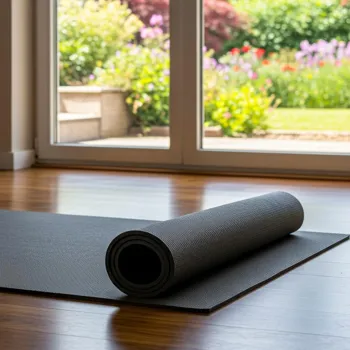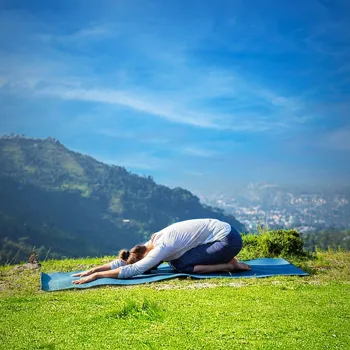Discover the transformative power of yoga! Uncover 7 key benefits & why it's a must in your fitness routine. Read on!
Namaste, fitness enthusiasts! In today's fast-paced world, finding the right balance
for our physical and mental well-being can be a real challenge. We're constantly bombarded with new workout trends, but sometimes, the answer lies in ancient practices.

Yoga, with its roots deep in Indian tradition, offers a holistic approach to fitness that goes beyond just building muscles. It's about connecting your mind, body, and spirit, and achieving a state of harmony.
Many of you might think of yoga as just stretching and breathing exercises, but it's so much more than that. It is not only about improving your body but also about improving your mind.
Let's delve into the wonderful world of yoga and explore why you should definitely consider adding it to your regular fitness routine. We'll uncover seven key benefits that will convince you to roll out that yoga mat and experience the transformative power of this ancient practice.
Yoga is very convenient when you do not have time to go to the gym. You can do it from home easily, there so many videos and articles in the internet available today on yoga which can guide you on how to do yoga. Yoga is very inexpensive as compared to gym or other forms of workout.
Enhanced Flexibility and Mobility: Goodbye Stiffness!
One of the most well-known benefits of yoga is its ability to improve flexibility. Many asanas (yoga poses) gently stretch and lengthen your muscles, increasing your range of motion.

This is particularly beneficial if you spend long hours sitting at a desk or engage in activities that restrict your movement. Over time, regular yoga practice can alleviate stiffness, improve posture, and make everyday tasks easier.
Think about reaching for that top shelf without straining, or bending down to tie your shoelaces with ease. Yoga makes those small moments easier. Holding a yoga pose helps in strengthening your muscles and makes them more flexible.
One should always do warmup poses before going into the complex poses
Different yoga styles cater to various levels of flexibility. If you're a beginner, styles like Hatha or Restorative yoga are a great starting point.
These styles focus on holding poses for longer durations, allowing your muscles to gently stretch and adapt. As you progress, you can explore more dynamic styles like Vinyasa or Ashtanga, which link movement with breath and offer a more challenging workout.
But no matter which style you choose, the key is consistency. Even short, regular yoga sessions can make a significant difference in your flexibility and overall well-being. Remember to listen to your body, and don't push yourself beyond your limits, especially when you're just starting out.
Everyone's flexibility is very different and we all have limitations.
Moreover, enhanced flexibility isn't just about physical comfort. It also plays a crucial role in injury prevention. When your muscles are flexible, they are less prone to strains and tears.
This is particularly important for athletes and those who engage in high-impact activities. Yoga can help you prepare your body for these activities by improving flexibility and range of motion, reducing the risk of injury. Also yoga helps in improving posture and body alignment.
We tend to ignore our posture and alignment in our everyday life which can cause problems in the future.
Strength Building: More Than Just Stretching
While yoga is often associated with flexibility, it's a fantastic way to build strength as well. Many yoga poses require you to support your own body weight, which builds both muscular strength and endurance.

Poses like plank, chaturanga (a yoga push-up), and warrior poses engage multiple muscle groups simultaneously, strengthening your core, arms, legs, and back. Holding these poses for extended periods challenges your muscles, forcing them to adapt and become stronger.
It will also help you to gain more focus, stability and will power. So yoga is not just for increasing flexibility it also increases strength.
Moreover, yoga builds strength in a balanced and sustainable way.
Unlike traditional weightlifting, which often focuses on isolating specific muscle groups, yoga works multiple muscle groups at once, promoting functional strength. This means that the strength you build through yoga translates into real-world activities.
You'll find it easier to carry groceries, climb stairs, and perform other everyday tasks. Always start with the beginner poses and then slowly move on to the expert poses. Pushing yourself too hard in your first yoga class can cause muscle pain and you may dread going again.
Always consult a doctor if you have any previous injury.
Furthermore, the strength you gain through yoga is often accompanied by improved balance and stability. Many yoga poses require you to maintain your balance, which strengthens the muscles that support your joints.
This is particularly beneficial for older adults, as it can help prevent falls and improve overall mobility. Yoga not only helps in building physical strength but also helps in building your mental strength. When you do yoga, you need to calm your mind and focus so that you can hold the yoga poses.
It will make you mentally stronger.
Stress Reduction: Find Your Inner Peace
In today's stressful world, finding effective ways to manage stress is more important than ever. Yoga offers a powerful tool for stress reduction through its combination of physical postures, breathing techniques, and meditation.
The physical postures help to release tension in your muscles, while the breathing techniques calm your nervous system. By focusing on your breath and body, you can quiet the mental chatter and find a sense of inner peace. Yoga is very beneficial for your mind as well as your body.
When you are stressed and do yoga, you will automatically calm yourself down.
Scientific studies have shown that yoga can lower cortisol levels, the hormone associated with stress. It also increases levels of endorphins, the body's natural mood boosters.
Regular yoga practice can lead to reduced anxiety, improved sleep, and a greater sense of overall well-being. Incorporating yoga into your routine can be as simple as starting with a few minutes of deep breathing each day or attending a weekly yoga class.
It is important to take the time for yourself. It is important to find calm in everyday life. You cannot focus on the important things in life when your mind is full and always thinking.
Moreover, yoga provides a space for self-reflection and mindfulness.
As you move through the poses, you become more aware of your body and your breath, allowing you to tune into your inner state. This heightened awareness can help you identify and address the sources of stress in your life. Yoga does not have to be for a long time.
A short yoga session of 15 minutes can also help to ease stress. In fact scientists have said that 15 minutes of meditation also has immense health benefits. Everyone leads stressful lives and yoga can be a good stress reliever.
Improved Cardiovascular Health: A Healthy Heart
While yoga is not typically considered a high-impact cardiovascular workout like running or cycling, it can still offer significant benefits for your heart health. Certain styles of yoga, such as Vinyasa or Ashtanga, elevate your heart rate and improve circulation.
These styles involve flowing from one pose to another in a continuous sequence, which challenges your cardiovascular system. When your heart rate goes up it is like a workout for the heart. It strengthens the heart and helps in regulation and keeping your heart active.
Furthermore, yoga's stress-reducing effects also contribute to improved cardiovascular health. Chronic stress can raise blood pressure and increase the risk of heart disease. By reducing stress, yoga can help lower blood pressure, improve cholesterol levels, and promote overall heart health.
Taking the time to focus on your breathing and body makes the change. Even though yoga is not a typical cardio activity, it can result in a big change. Cardiovascular exercises are very important so that you lower your blood pressure. Yoga also helps with that.
In addition to the direct cardiovascular benefits, yoga can also improve your lifestyle habits, which indirectly benefits your heart. People who practice yoga are more likely to adopt healthy behaviors such as eating a balanced diet, getting enough sleep, and avoiding smoking.
These lifestyle changes further enhance your cardiovascular health. Therefore, adding yoga to your routine is a good way of keeping healthy and have a balanced lifestyle. So many people suffer from heart issues and yoga can be the solution.
Enhanced Body Awareness: Listen to Your Body
Yoga encourages you to become more attuned to your body and its needs. As you move through the poses, you learn to pay attention to your sensations, both physical and emotional. This heightened body awareness can help you identify areas of tension, discomfort, or pain.

By listening to your body, you can learn to modify poses to suit your individual needs and prevent injuries. It is important to listen to your body. Our body gives us signs and tells us what we should do. We should listen to our body closely.
Doing yoga everyday makes you more attuned to the needs to your body.
Moreover, enhanced body awareness extends beyond the yoga mat. As you become more aware of your body, you'll start to notice how different activities and foods affect you.
This can help you make healthier choices in your daily life, such as eating nutritious foods, getting adequate sleep, and avoiding unhealthy habits. Every body is different and listening to it closely will help you better understand what works and what doesn't.
Start with your body and mind and then adapt to the surroundings. With such practices, you will get to know yourself even better.
Furthermore, yoga promotes a sense of self-acceptance and body positivity.
As you become more aware of your body, you learn to appreciate its strengths and accept its limitations. This can lead to a more positive body image and increased self-confidence. When you feel good about yourself, it reflects on your activities and lifestyle.
Yoga helps you enhance awareness of your body. It helps you become more positive and have confidence in yourself.
Improved Sleep Quality: Rest and Recharge
If you struggle with sleep, yoga can be a natural and effective remedy. The stress-reducing effects of yoga can help quiet your mind and relax your body, making it easier to fall asleep and stay asleep.

Certain yoga poses, such as child's pose and legs-up-the-wall pose, are particularly effective for promoting relaxation and preparing your body for sleep and when you do yoga, your mind becomes quiet so that it is very helpful to get some sleep.
As nowadays people work late, people tend to have sleepless nights, yoga can be a very good solution.
Moreover, yoga can help regulate your body's natural sleep-wake cycle. Regular yoga practice can help reset your circadian rhythm, the internal clock that regulates your sleep patterns.
This can lead to more consistent and restful sleep. When you get the right amount of sleep you also tend to be very happy. It is important to have the right amount of sleep because if you do not have enough sleep you are not fit and you will not feel good about yourself.
When you sleep, our body recharges itself so that you can continue your daily activities the next day.
Furthermore, yoga can help address underlying sleep disorders. For example, yoga has been shown to be effective in reducing symptoms of insomnia and sleep apnea.
By addressing these underlying issues, yoga can improve your overall sleep quality. You will not feel tired. Yoga is a simple way to make your life healthy. With many people now having mental disorders, yoga can be the solution to cure them. Always remember to consult a doctor about mental health.
AI Generated Content. Glance/InMobi shall have no liability for the content












